Afghanistan War, Civil Liberties, FBI Intrusion, Habeas Corpus, Human Rights, Prison Industry, Surveillance, Targeting Muslims, Torture
Podcast: Play in new window | Download
Updates:
—–
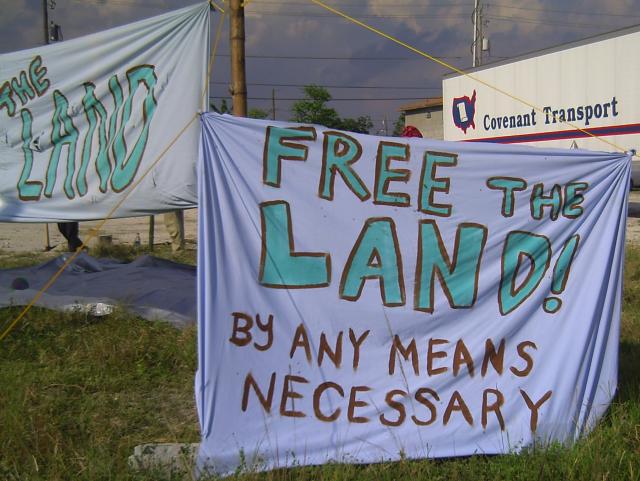

Take Back The Land and The Center For Constitutional Rights Delegation To South Africa
The national movement, Take Back the Land has demanded housing for the homeless in Miami, New York City and is in South Africa to engage in anti-eviction and land reform work. Lawyers with the Center for Constitutional Rights will also join Take Back the Land and provide legal support to the social justice movements. The two groups will be in Cape Town with the Anti-Eviction Campaign and 3 days in Durban with Abahlali bs Mjondolo or (ABM). Among the core beliefs of this project called the Center for Pan African Development are, land is an essential element of liberation, the black community must collectively control land in the black community and the path to liberation is pave through self-determination, not the accommodation of those in power.
Sunita Patel:
- The history of Apartheid is so connected to land and redistribution of land. We spent a few days in Cape Town with the Anti-Eviction Campaign. We traveled to Durban and visited with ABM there. Throughout the trip activists and community members had shared stories of displacement and mass evictions at the government’s hands, without any redress. We have a lot to learn from the movement in South Africa.
- In the United States, we can’t think beyond the private ownership of land.
- Housing is not a constitutionally protected right. Where we can gain from international human rights law, we need to infuse that into our work. The Universal Declaration of Human Rights, recognizes housing as a human right.
- South African Constitution states in articles 26 and 33 affording one house for one family.
Guest – CCR staff attorney, Sunita Patel is involved with racial profiling, immigrant rights and other human rights litigation. Prior to her position at CCR, she held a Soros Justice Fellowship at The Legal Aid Society, Immigration Law Unit in New York where she represented immigrant detainees in removal proceedings and worked with criminal justice and human rights groups to create independent community oversight for detention operations through public accountability boards.
————–
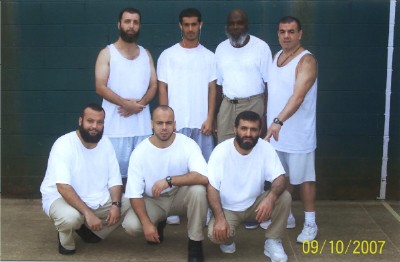

CCR Challenges Experimental Prison Units that Restrict Communication
The Center for Constitutional Rights filed a lawsuit challenging violations of fundamental constitutional rights, including the right to due process, at two experimental federal prison units called “Communications Management Units” (CMUs). The units are being used overwhelmingly to hold Muslim prisoners and prisoners with unpopular political beliefs.
CCR filed Aref v. Holder in the D.C. District Court on behalf of five current and former prisoners of the units in Terre Haute, IN and Marion, IL; two other plaintiffs are the spouses of prisoners. The CMUs were secretly opened under the Bush administration in 2006 and 2007 respectively and were designed to monitor and control the communications of certain prisoners and to isolate them from other prisoners and the outside world. More about Aref
Rachel Meeropol:
- It’s the first time we’ve seen units like this in the federal system. The Bureau of Prisons secretly created these prisons in 2006 and 2007 under the Bush Administration.
- The bureau of prisons initially offered a public comment period and were flooded with comments of what a bad idea this is. They withdrew the public comment and continued to build the prison in secret.
- There’s no meaningful process at all as to who should be put in this unit.
- The Bureau of Prisons has published very broad criteria about the types of individuals, it thinks belongs there.
- The criteria is so broad it could encompass tens of thousands of prisoners.
- When we look at who is being sent the unit, it’s mostly Middle Eastern Muslims, African Americans who have converted to Islam in prison, and also a lot of people with unpopular political views.
- One of our clients Daniel McGowan, is an environmental activist who is serving a term in prison. He never violated a prison rule, he was a low security prison for the first part of his sentence, and then without any reason, he is moved to this highly restricted unit.
- The CMU is an experiment in social isolation. Very few opportunities for visits. Uniquely cruel for individuals who have to undergo it.
- Bad public policy, these individuals are going to be released at some point.
- We are seeking to challenge the extreme limitations on their phone calls and visits.
- Most inmates get 300 minutes a month of phone calls, my clients for years had only one 15 minute call a week.
- For prisoners with large families, this is incredibly difficult. It seems to me this is truly about silencing advocacy from inside the prison.
- Some of our clients including Mr Aref were convicted on terrorism related charges, in his case material support.
- When prisons move prisoners into the CMU of extremely restricted confinement without any process or explanation, of course leads to putting prisoners in the CMU for discriminatory or retaliatory reasons.
Guest – Rachel Meeropol has worked at the Center for Constitutional Rights (CCR) since 2002. She is the co-editor and primary author of the Jailhouse Lawyers Handbook, a widely-requested resource for prisoners, and the editor of America’s Disappeared: Secret Imprisonment, Detainees, and the “War on Terror,” (Seven Stories Press, 2005).
—————–
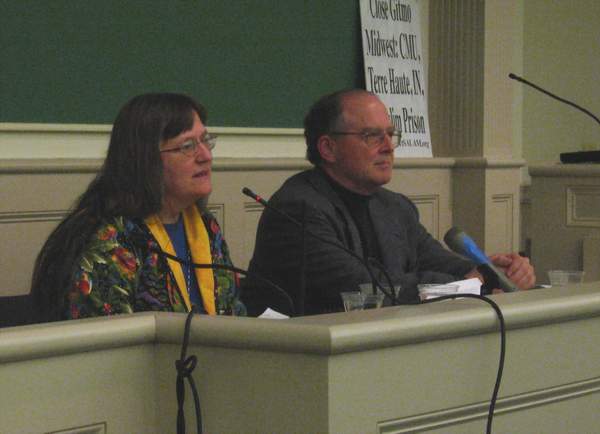
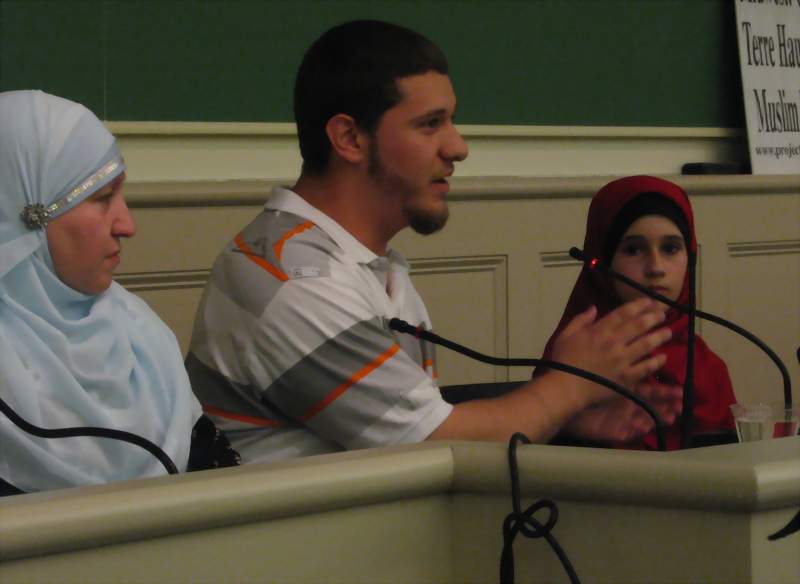
FBI Entrapment: Personal Stories of Preemptive Prosecution
We go now to hear segments from the event titled FBI Entrapment: Personal Stories of Preemptive Prosecution sponsored by the National Lawyers Guild, Middle Eastern Law Students Association (MELSA), Islamic Law Students Association (ILSA) and Law Students for Human Rights.
Families and community members gathered in a room at NYU to discuss their cases, and how their family members were entrapped by FBI informants and agent provocateur tactics. As we have reported in the past years, the FBI have used these tactics to target Muslims and others by offering money and assets within impoverished communities. Some FBI groups target mosques and incite violent action. Most informants are felons, that have made plea-deals with the FBI. As we have seen, these stories make headlines across the country on Memorial Day or the 4th of July, meanwhile, these men implicated in the FBI stings are serving long sentences. We get an inside perspective from their families. We hear from Lynne Jackson and Attorney Stephen Downs from Project Salam. We also hear from 12 year old Lejla Duka, and her cousin, family members with the Fort Dix Five case.
Lynne Jackson / Attorney Stephen Downs
- CCR filed Aref v. Holder in the D.C. District Court
- Aref/Hossain have left behind 2 families, 10 children, ranging in ages 4-16 years old.
- What is going on with our country?
- We formed Project Salam, we need to look at all these case together, there are hundreds of cases.
- We’ve had no response at all from President Obama or Attorney General Holder
- The Cheney one percent doctrine. If there is one percent chance that a Muslim will commit a terrorist act down the road you have to take them out.
- One of the worst things you can do as Muslim is be generous. The government made good use of the material support for terrorism statute.
- Certainly from my point of view, as a lawyer I assume every conversation I have is being monitored. I think all of you should to.
- Check out prisoner database at CMU’s (PDF)
Lynne Jackson, volunteer and co-founder of Project Salam, Attorney Stephen Downs, a retired New York State attorney and a volunteer attorney for the Yassin Aref case. Listen to last year’s Law and Disorder interview.
————————————————————————–
Civil Liberties, Criminalizing Dissent, FBI Intrusion, Gaza, Human Rights, Prison Industry, Truth to Power
Podcast: Play in new window | Download
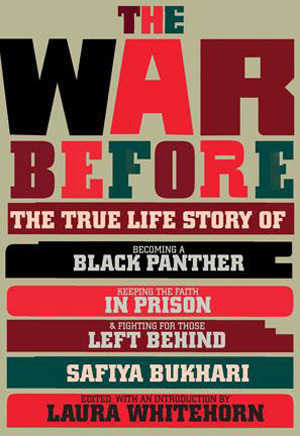
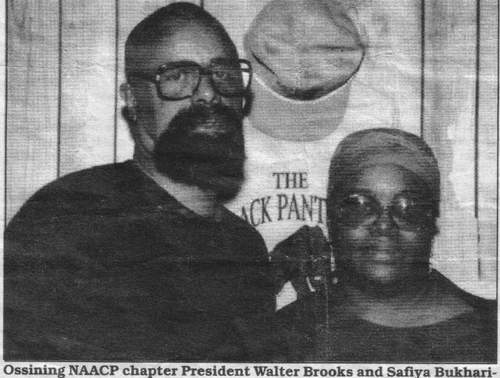
The War Before: The Story of Black Panther and Political Prisoner Safiya Bukhari – By Laura Whitehorn
We’re delighted to have political activist and former Weather Underground member Laura Whitehorn back with us to talk about her new book titled, The War Before. In the book about Laura introduces us to Safiya Bukhari, a member of the Black Panther Party in the late 1960s. The War Before traces Safiya’s life’s commitment of organizing around the rights of the oppressed. Through Safiya’s personal writings, we hear her unique perspective of what had happened to the Black Panther Party and her personal insights into the incarceration of outspoken radicals. Safiya, herself a longtime political prisoner and jailhouse activist, died in 2003. It was at the request of Safiya’s daughter Wonda Jones, that Laura assembled and edited the War Before.
Laura Whitehorn/Sundiata Sadiq:
- When I was first in prison there was no library. Nothing. Whoever we were as political prisoners, we would have met Safiya. When she got out of prison in 1983, she made it her business to go and fight for every political prisoner in this country, that she could get to who wanted to be part of a movement to free political prisoners.
- Safiya: The fight for the freedom of political prisoners can’t be separate from the fight against repression in general whomever that is effecting. If she were alive today, I’m sure she would have been at the rally for Fahad Hashmi and fighting for the rights of immigrant detainees.
- Safiya: Political prisoners will continue to arise if people oppose the government.
- This book began with Wonda Jones (Safiya’s daughter) Wonda in some ways has been working on this book for her entire life.
- Safiya was aware all the time that the “freedom and democracy” that this country promotes as its image only exists on the suffering of so many people. Her politics were a challenge to the government all along, her being was a challenge.
- Some of these are essays, some of these are speeches. Safiya was investigating, she was questioning, she was willing to look at herself, what each of us brings into a movement. There is a connection between her humility, her honesty and her commitment.
- Sundiata: I became close to Herman Ferguson and Safiya.
- Laura: I was in prison when Jericho was founded.
- Sundiata: I was asked to get Sofiya into the Sing Sing Prison to talk to the brothers.
- They had to remove her (Safiya) uterus because of fibroids.
- In the February issue of the Monthly Review we have an excerpt of Sofiya’s chapters. It’s about post traumatic stress symptoms in the Black Panther party. When I was putting this manuscript together and re-read it, I thought, I would like people to read this book from beginning to end.
Guest: Laura Whitehorn – revolutionary ex-political prisoner and native New Yorker Laura Whitehorn. Since the 1960s Laura was active in supporting groups such as the Black Panther Party, the Black Liberation Movement and was active with Students for a Democratic Society and the Weather Underground. Laura also worked to expose the FBI’s Counter Intelligence.
Guest – Sundiata Sadiq. (Walter Brooks) He is a leading member of the Free Mumia Abu-Jamal Coalition in New York City and was a close friend of Safiya Bukhari for many years. Sudiata has been politically active since the late sixties, and he was also the president of the Ossining, New York Chapter of the NAACP.
—-
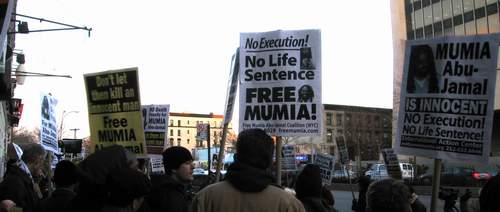
Educators for Mumia Abu-Jamal: Johanna Fernandez
The U.S. Supreme Court recently re-opened the possibility that Pennsylvania may execute award-winning journalist and world-renowned “Voice of the Voiceless” Mumia Abu-Jamal. The high Court referred his case back to the Third Circuit to reconsider its 2008 decision that Mumia could have a new penalty phase hearing in light of the Court’s ruling in the Ohio case of Smith v. Spisak. Spisak’s jury-imposed death sentence had been reversed when his attorneys, like Mumia’s, successfully invoked a critical 1988 Supreme Court decision in the Mills V. Maryland case. Mills rejected the idea that jurors had to be unanimous on the mitigating circumstances that existed in a case. Before Mills, juries had little or no alternative but to impose death if even one juror blocked consideration of a mitigating circumstance. The High Court’s recent decision in Mills will now make it easier to obtain death sentences in capital cases; Mumia’s attorneys will argue that his case is distinguishable from Spisak’s.
Mumia as many know, was convicted and sentenced to death for the 1981 murder of police officer Daniel Faulkner. A previous guest here on Law and Disorder, author/ journalist J. Patrick O’Connor who wrote The Framing of Mumia Abu Jamal, says the real shooter was Kenneth Freeman a business partner of Mumia’s brother. Freeman, was found dead in 1985, bound and cuffed in a Philadelphia parking lot.
Professor Johanna Fernandez:
- Educators for Mumia Abu-Jamal emerged in the 1990s to build a profile for Mumia on college campuses among educators and students.
- We’re also making the movement mainstream in pointing out what’s wrong with the criminal justice system.
- We’re getting a hip hop show for schools for spring break (Pennsylvania colleges)
- We want to educate young people and students in a nation that incarcerates 3 million people. That’s the size of San Francisco.
- I’ve known Mumia for about five years. I have used Mumia in the classroom live through phone conference. He speaks on issues such as the Vietnam War, the civil rights movement, the Black Panther Party and the criminal justice system today. These live conferences are incredibly powerful.
- Conversations with Mumia are intense, we talk about politics, Obama. We talk a lot about what life is like on death row. His cell is the size of a small bathroom. He’s only allowed 20 books at any given time. His cell is messy because he’s a researcher, a writer.
- Mumia: food is horrendous. They’re allowed to buy food, MRE style pre-packaged dry food. The servicing of inmates in this country is a billion dollar industry.
- What’s interesting about his situation is the state has tried to strip him of his intellectual vitality. Although they have failed, he’s written six books from death row, he’s got his radio journals.
- The first thing the movement is asking people to do is to arm themselves with the facts of the case. Then you can sign a petition. There’s another petition calling for Obama to make a statement on the case.
- If you’re a student or a university professor we are asking you to help us organize a large town hall meeting, for April 3, 2010 (likely in NYC) Mumia’s case should be taken up during Black History Month by colleges all over the city.
Guest – Educators for Mumia member Johanna Fernandez. Johanna Fernandez is a native New Yorker. She received a Ph.D. in History from Columbia University and a B.A. in Literature and American Civilization from Brown University.
——-
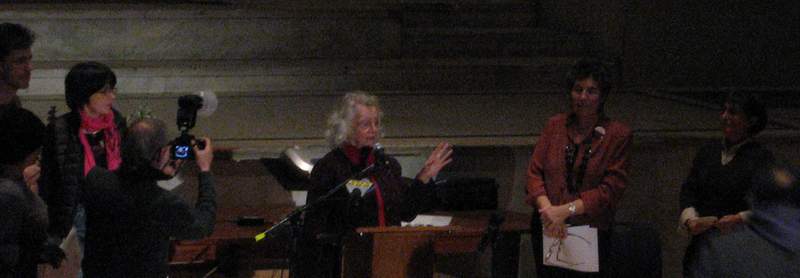
Gaza Freedom March Report Back Speeches
We hear another strong speech from Palestinian teacher and filmmaker Fida Qishta. Fida is from Rafah, Southern Gaza.
Gaza Freedom March Commitments Include:
- Palestinian Self-Determination
- Ending the Occupation
- Equal Rights for All within historic Palestine
- The full Right of Return for Palestinian refugees
From: Waging Nonviolence blog. The Egyptian government didn’t let most of the over 1,300 protesters from around the world into Gaza for the planned march, but those at Judson said that they witnessed a new stage in the emergence of a global movement, facilitated by the Internet, that may well be poised to end the international support that makes Israel’s policies possible. The lynchpin of the movement, the Cairo Declaration of the Gaza Freedom March, was drafted by would-be marchers while they waited in Egypt.
——————————————————————————————–
Afghanistan War, Civil Liberties, Criminalizing Dissent, Death Penalty, FBI Intrusion, Human Rights, Prison Industry, Supreme Court, Surveillance, Targeting Muslims, Torture, Truth to Power
Podcast: Play in new window | Download
Updates:
—

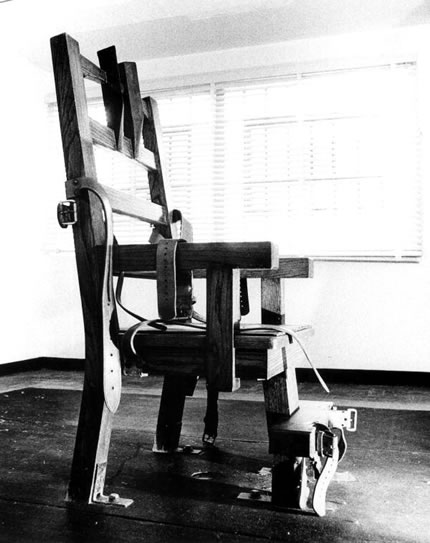
The Death Penalty Loses Support of The American Law Institute
In late 2009, the American Law Institute, which created the intellectual structure for the current capital justice system for nearly 50 years, essentially announced that its project has failed. The American Law Institute or A.L.I. is made up of around 4 thousand judges, lawyers and law professors, streamlines law and model codes to provide coherence in a federal legal system that is usually taking a varied approach. In a 1962 Model Code, the best legal minds of the institute framed a way for the death penalty to be carried out fairly, it then was re-instated in 1976. Now, the same people disavow the structure saying there is no fair system of capital punishment. The New York Times, in one article wrote (quote) the institute’s move represents a tectonic shift in legal theory. The article also points out that capital punishment was plagued by problems including racial disparities.
David Seth Michaels:
- American Law Institute, the intellectual group that tries to cobble together federal law in the United States including capital punishment. The capital punishment rules that they invented fifty years ago, have been the groundwork on which everything has happened since.
- So, it comes as a bit of a shock that fifty years later, they say “oh, oh.” It doesn’t work. It won’t work, we can’t make it work, so we’re going to fold up our tents. We won’t have anything else to do with it.
- Unworkable elements in the system: They’re troubled by the racial disparity on who gets executed, there’s tremendous disparity that is regional across the U.S. The prospect of capital punishment is ridiculously expensive. There’s risk of executing innocent people and politics of appointed judges who wantonly convict.
- It’s one of these circumstances that it is irreparably falling apart, broken. Everywhere you turn you find horrendous errors, egregious discrimination.
- The murder rate is higher in places where they have the death penalty than places where they don’t have the death penalty. Public support for the death penalty has been slowly and gradually decreasing.
- In the early 70s I became concerned about conditions in the prisons and mental hospitals in Tennesee and Mississippi. This is after the restoration of the death penalty in 1976.
- I can’t wait for the day that capital punishment is abolished. This system can’t die soon enough. You got nobody supporting the death penalty on an intellectual basis.
- National Coalition Against the Death Penalty.
Guest – Attorney David Seth Michaels. David has represented clients for 30 years, clients such as prison inmates in Mississippi and Tennessee. He’s worked with Brooklyn Legal Services B and with the Federal Defenders Service Appeals. He is also a novelist, has his own practice in New York.
—————————-

Lawyers You’ll Like: Jim Lafferty Part II
We’re delighted to have back with us attorney Jim Lafferty for the second half of our Lawyers You’ll Like series. He is the Executive Director of the National Lawyers Guild in Los Angeles and host of The Lawyers Guild Show, a weekly public affairs program on Pacifica radio sister station KPFK, 90.7 FM in L.A.
He has served as a chief officer of, and spokesperson for, various national anti-war coalitions, including the National Peace Action Coalition, the anti-Vietnam War coalition that organized the largest protests during that war; the National Coalition for Peace in the Middle East; and, the National Campaign to End U.S. Intervention in the Philippines. In the 60s and 70s, his law firm, Lafferty, Reosti, Jabara, Papakian & Smith, represented virtually all of the left political movements in and around Detroit, Michigan, during which time he became one of this nation’s leading experts on Selective Service law and military law.
In the early 80’s, Mr. Lafferty founded and chaired the largest A.C.L.U. Chapter in the State of Michigan. In New York City, in the late 80’s and early 90’s, he traveled the world organizing on behalf of the labor rights of merchant seafarers. During this time he also taught a course at the New School for Social Research, entitled, Vietnam: The War at Home and Abroad. More recently, Jim Lafferty was the Coordinator of the L.A. Coalition to Stop the Execution of Mumia Abu-Jamal, as well as a member of the national steering committee of the Campaign to Stop the Execution of Mumia Abu-Jamal.
Jim Lafferty:
- The man who was presented to me as my uncle, when I was sixteen he died, my mother acknowledged that he was my father. A friend of mine, she was a white nurse and she was married to a white school teacher and had a 3 year old daughter.
- She divorced that man and married a black surgeon. Her mother and former husband wanted custody feeling it was inappropriate for child to be raised in biracial home. George Crockett was one of the lawyers in the National Lawyers Guild in Michigan, took the case only if I clerked and read every opinion on domestic relations given down by the Michigan Supreme Court.
- We lost that case, and I continued working with that firm. They made a movie about that called “One Potato, Two Potato”
- The firm had been lawyers for UAW. I had gone down South to work with the lawyers guild in 1963, I was taking depositions for the Freedom Democratic Party. That’s where I met Mary Robinson.
- Bill Kunstler and Arthur Kinoy / Bill Kunstler’s book (1966) Deep In My Heart
- Michael Smith: Jeff Haas says Fred Hampton had Bill’s book, Deep In My Heart on his bed.
- When you finally take a stand, even though it leads to your incarceration and apparent lack of freedom, you’re finally free. Anti-war movements: Some friends of mine ran as peace candidates just to bring up the question of the war. We ran the entire campaign for 3300.00. Including 10 small billboards. Later we put together the Detroit Coalition to End the War in Vietnam Now.
- I wasn’t representing people anymore, but as the head of this coalition, you were doing public speaking, and getting an appreciation for what the power of people could do. To the credit of those lawyers who were winning those victories, even then they were saying to younger lawyers like me, but the real important thing is what goes on in the streets.
- Los Angeles Chapter of the National Lawyers Guild, – Labor Movement is vital. The anti-war movement is vibrant. You can’t blame the young activists for not knowing history, because nobody’s bothered to teach them. I’d like to see the movement coalesce around a meaningful left socialist third party.
- On the issue of the war, we’re worse off than we were with Bush.
- Healthcare plan: boondoggle for insurance companies, if you insure people who haven’t been insured, the profits of insurance companies aren’t gonna go down, you and I will pay more. Whereas the government should be paying more. NY Times article: putting aside the public option, you get past it by not dealing with it.
Guest – Attorney Jim Lafferty, Executive Director of the National Lawyers Guild in Los Angeles and host of The Lawyers Guild Show, a weekly public affairs program on Pacifica radio sister station KPFK, 90.7 FM in L.A.
————————————————————–
Criminalizing Dissent, FBI Intrusion, Habeas Corpus, Human Rights, Prison Industry, Supreme Court, Surveillance, Truth to Power
Podcast: Play in new window | Download
Updates:
——-
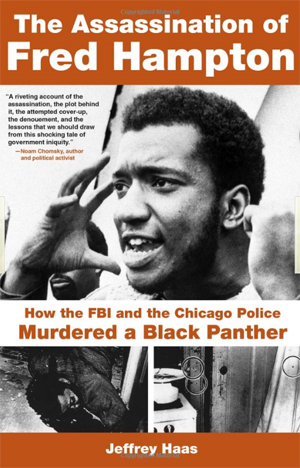
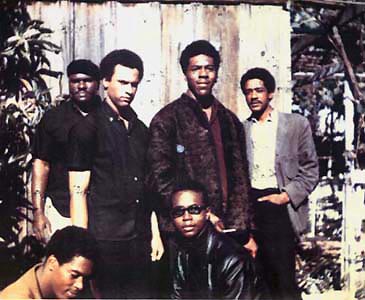
THE ASSASSINATION OF FRED HAMPTON: How the FBI and the Chicago Police Murdered a Black Panther
We are pleased to have with us author and National Lawyers Guild attorney Jeff Haas. His new book The Assassination of Fred Hampton: How the FBI and the Chicago Police Murdered a Black Panther, is a page turning true crime story chronicling the tragic murder of Fred Hampton, the young leader of the Chicago Black Panthers. On a dark December day, Chicago police unloaded 80 rounds into Fred Hampton’s bedroom, leaving his pregnant fiancee Deborah Johnson in shock having barely survived. The killing horrified the black community in Chicago. As Haas describes, it took 13 years of grueling litigation from the attorneys at the People’s Law Office collective to finally convict the FBI, the Cook County States Attorney Edward Hanrahan, and the Chicago police for their summary execution Fred Hampton. He was only 21. Today, 40 years later, the People’s Law Office still active in suing and scandalizing the Chicago police for torturing and extracting false confessions from over l00 black men in a south side police station. Jeff Haas Book Tour Dates NYC
Jeff Haas:
- Fred Hampton started in high school, he led a walk out because black girls weren’t considered for Homecoming Queen. He took on the issue of not having enough black teachers and black administrators. Wherever he saw injustice, he felt compelled to deal with it. At ten years old, he started his own breakfast for children program.
- He came from a warm family, in Louisiana, on farms where his grandparents had been slaves.
- I came from Atlanta, GA, a middle class Jewish family. I grew up as many were somewhat raised by blacks, there was a black man who worked at our farm who I idolized. He taught me how to plow with a mule, drive a tractor, things most kids don’t know how to do.
- At school in Chicago, my classmates consisted of John Ashcroft and Bernadine Dorhn. Ashcroft didn’t have much to say in those days. I was with Dr. King, when he marched in Chicago, the anti-war movement was at a peak, the black power movement was strong. There had been riots in the cities.
- Kennedy and King had been assassinated in 1968. It seem like things were headed for the falls, or the rapids.
- I met Fred Hampton because I was in Chicago. He was then head of the NAACP youth branch. A dynamic speaker. Fred could talk to welfare mothers, he could talk to law students, he could talk to gang kids.
- He said basically, if you’re not going to do any revolutionary act by the time you’re 20, you’re dead already.
- The Chicago panthers grew quickly from Nov. 1968, when they started, until his death in 1969.
- Forty years ago, my partner knocked on my door. I opened it and he said the chairman is dead, the pigs vamped on his crib this morning.
- It took me, how the police had killed him. I went and interviewed his fiancee. She told me they entered a room where Fred was semi-conscious.
- First we and with a lot of support from the National Lawyers Guild, the Center for Constitutional Rights filed a civil suit to find out what happened.
- Quickly we found out that the police raid was a shoot in, not a shoot-out. Ninety police shots to 1 shot from the Panthers. We also found out 3 years into the investigation that the FBI had provided a floor plan to the raiders, that showed the bed where Fred would be sleeping.
- And that bed was where the shots converged, so we pursued discovery.
- We found out that the FBI sent a letter to head of the Blackstone Rangers, a year before Fred was killed saying, dear brother, Fred has put a hit out on you. The FBI wanted someone else to do their dirty work.
- The FBI worked on creating conflict between the 2 groups. One of the objectives of the COINTELPRO program was to prevent the rise of a messiah who could unify and electrify the masses.
- Fred Hampton had a slogan, you can kill the revolutionary, but you can’t kill the revolution.
- You can still kill a freedom fighter, but you can’t kill freedom fighting. I think losing a black leader like Fred Hampton does set back the people’s struggle. His spirit, the non-compromising pursuit of justice lives on also.
Guest – Jeffrey Haas is an attorney and cofounder of the People’s Law Office, whose clients included the Black Panthers, Students for a Democratic Society, community activists, and a large number of those opposed to the Vietnam War. He has handled cases involving prisoners’ rights, Puerto Rican nationalists, protesters opposed to human rights violations in Central America, police torture, and the wrongfully accused.
—————————————————————————————————–
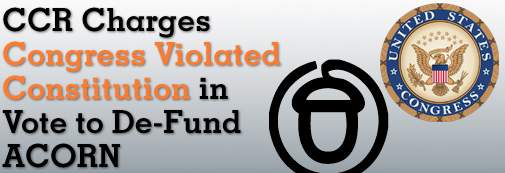
The Center For Constitutional Rights: Acorn Lawsuit
The Center for Constitutional Rights has filed a lawsuit on behalf of the community group ACORN. ACORN was recently barred funding by a Congressional Resolution. The lawsuit charges that Congress unfairly targeting the organization and is seeking a temporary restraining order to prevent the government from reallocation funds meant for ACORN. The Center for Constitutional Rights Legal Director Bill Quigley says it’s an outrage to see Congress violating the Constitution and politically grandstand. Bill continues – “With all the crimes and infractions committed by banks, pharmaceutical companies, and private government contractors, they have been rewarded with bailouts, tax credits, and billions of dollars in new contracts. Congress bowed to FOX News and joined in the scapegoating of an organization that helps average Americans going through hard times to get homes, pay their taxes, and vote. Shame on them.”
Bill Quigley:
- ACORN is an association of community organizations that has about 500 hundred thousand members across the United States. They’ve been in existence for some 35 years. They do voter registration, housing foreclosure work, issue organizing.
- In the last five years or so, they’ve registered nearly 2 million to vote. So, they’ve been the target of the right wing for some time. They do very aggressive outreach to get folks who haven’t been registered.
- Regarding sex scandal: The people in those offices, they’re low paid workers, but their goal is to help first time home buyers. So, these tricksters, they were into prostitution, the truth is the people at ACORN would try to help you whether you were a prostitute or not.
- ACORN tried to give advice and some of the people went too far concealing the nature of their work.
- Apart from the politics of punishing people for registering folks to vote, there is a specific part in the US Constitution that’s been in there since the beginning that prohibits what’s called a Bill of Attainder
- Constitution of the United States, Article I, Section 9, paragraph 3 provides that: “No Bill of Attainder or ex post facto Law will be passed.”
- We’re familiar with what happened in England, in Parliament, people in parliament would get all fired up about something and they would just have a specific bill naming a person or organization, and they were outlawed, they could receive the benefits of being a citizen. So the Congress outlawed that.
- So, what they did here, is without any hearings before Congress, without any investigation whatsoever, just based on the rumors and the FOX news sort of stuff. They said that ACORN and any of subsidiaries, or even allies, couldn’t receive any federal funds.
- A one sentence prohibition. It impacts millions of dollars of funds, not going to big salaries.
- It effects ACORN Housing organizations around the country. A lot of the housing works stopped.
- ACORN people have come to us and say we’ve been to law firms around this country but no one can help us now, because we are so stigmatized.
- The framers of the constitution didn’t want Congress to be the prosecutor, judge jury and executioner. We have a way to do this.
- If there’s more to this than just the rumor mongering that’s been done, then there are ways to do it. HUD, Department of Justice, IRS, can say, we suspect you’re misusing the funds and set up a hearing.
- The right wingers didn’t want to go this way, they did an end run and we’re hoping that the courts are going to set that aside.
Guest – CCR Legal Directory Bill Quigley. Bill has been an active public interest lawyer since 1977 and worked with a wide range of public interest organizations on an equally wide range of issues. He has litigated numerous cases with the NAACP Legal Defense and Educational Fund, Inc., the Advancement Project, and with the ACLU of Louisiana, for which he served as General Counsel for over 15 years.
———


Film Professor Sues University for Violating Right to Academic Free Speech
In the fall of 2007, Dr. Terri Ginsberg was hired to teach a film class at the North Carolina State University focusing on the media treatment of the Israeli-Palestinian conflict in 2008. She was also hired to help program a Middle Eastern film series. As Terri details in a grievance the director of the film studies program and the director of the Middle East studies program made a series of decisions that violated her academic freedom. Among the decisions was the limiting of Terri’s invovlement in the series that she had initially been hired to curate. Another was the criticism of an introduction she gave at the screening of the Palestinian film “Ticket to Jerusalem” as biased and overly political.
The grievance filed alleged violations of her First Amendment and equal opportunity rights under the University Code. Her grievance was dismissed on the grounds that it was filed too late and that she was no longer a university employee. Terri has now filed a lawsuit, one mention in the complaint states that in the views of several faculty, Jews who question and challenge the zionist colonial project are non-conforming Jews and therefore are outsiders and dangerous.
Terri Ginsburg / Attorney Rima Kapitan
- I was given strong indication the teaching professorship would convert into a permanent tenure track position.
- That I should apply for it and that I was a shoe in for that position. So I moved down from New York City, where I lived for many years to Raleigh, NC. Not long after I got there, a number of incidents occured that led me to believe the conversion was not going to take place.
- Key people in the faculty were very unhappy with my perspectives on the Israeli – Palestinian conflict and on Zionism. I am a Jewish Anti-Zionist, and I wanted to supply a genuinely balanced perspective on the issue of Zionism and the history as it has been depicted in cinema
- I showed Israeli films, I showed Palestinian films, I showed the array of cinema on this topic.
- This is a large campus upwards to 40 thousand students.
- I was asked to resign from a middle eastern series after I gave an introduction to a film that was pro-Palestinian.
- Attorney Rima Kapitan: Right now we’re alleging they violated her North Carolina Constitutional Rights. They breached her right to academic freedom and equal protection under the law.
- Terri covered every path in North Carolina, the only thing left is a constitutional claim in North Carolina.
- Under the equal protection claim, we’re saying Terri was treated differently because of her religion.
- Terri: The atmosphere is increasingly worse not only for Jews but anyone who speaks out on this issue, especially for non-tenured and temporary labor.
- I had minimal support from the AAUP, they failed until we put out a petition that received over 500 signatures.
- Most faculty on campus were afraid to communicate with me, over email, over telephone.
- I think the Israel-Palestine conflict is one of the core issues facing the United States.
- Film is a small field and gossip travels fast. I’m unemployed. When I did my research on the holocaust, I couldn’t ignore the structural relationship between the holocaust and the Nakba.
Guest- Dr. Terri Ginsberg joins us in the studio today she has a Ph.D. in Cinema Studies from New York University and previously taught in the Jewish Studies Program at Dartmouth College and the Cinema Studies Program at Rutgers University. CODZ
Guest – Attorney Rima Kapitan – staff Attorney at CAIR-Chicago. She is a graduate of DePaul University College of Law and Indiana University and a partner with Amal Law Group, LLC, a general practice law firm. Her main areas of interest and specialization are plaintiff-side employment discrimination, civil rights law, workers compensation and estate planning. She is active in the National Lawyers Guild Middle East Committee.
———————————————-
Afghanistan War, Censorship, Civil Liberties, Climate Change, Criminalizing Dissent, FBI Intrusion, Habeas Corpus, Human Rights, Surveillance, Targeting Muslims, Torture, Truth to Power
Podcast: Play in new window | Download
Updates:
—————————–

Capitalism Hits the Fan: The Global Economic Meltdown and What to Do About It (THE BOOK)
Today we welcome back Rick Wolff, Professor of Economics at the University of Massachusetts to discuss his new book titled Capitalism Hits the Fan: The Global Economic Meltdown and What to Do About It. In his book, Rick takes the reader back to 2005 and step by step reveals how policies, economic structures and wage-to-profit systems led to a global economic collapse.
Rick Wolff will give us an update on why the media claims the recession is over, he also tells us if there be another leg down as predicted in the September 21st interview. Another leg down meaning, will the economy continue to drop? This was mentioned because of the way people were investing, investing in a way that expected the market to drop.
Rick Wolff:
- The origin of the economic crisis goes deep into history. It’s one of the key things that people don’t understand or want to face. Roots of a System’s Crisis
- We were a country founded by foreigners coming here, they got rid of the indigenous population. They established a mix system. Capitalism on one hand, with employers and employees, and then self employed farmers and small crafts people, and in the Southern US, slavery.
- When the dust cleared, capitalism came through, it destroyed slavery and suboridinated the self employed to be small and on the margins.
- For 150 years – 1820-1970 the growth of capital was outrunning the available labor supply. Laborers had options, could go West.
- For 150 years, the goods and services a person could buy from an hour of their wages kept going up. It produced a strange and unusual notion that you were blessed, if you worked hard you would make more money.
- That Americans could have a dream like that. . their children could have a better life and deliver on the promise.
- It drew millions of immigrants from all over the world etc.
- Then after the 1970s capitalism reminded us that it is not a guarantee that if you work hard you will be rewarded.
- In the last 30 years wages have not anymore gone up. It’s a sea change in our culture’s history.
- Wages stayed the same for these reasons:
- The arrival of the computer that substituted people for machines on a mammoth scale
- The movement of corporations to other parts of the world to take advantage of cheaper labor.
- Women and immigrants moving into the paid labor force. This plunged the US economy into a disaster zone.
- The end of rising wages. Americans today work 20 percent more hours a week, than their counterparts in France, Germany or Italy. They are exhausted physically. The families are in disarray.
- Then to consume more, live the American dream, they borrowed on credit, the likes of which no working class in the history of the world has ever done.
- The average debt of US family in the 1920s equaled about 1/3 of its annual income. In 2007, the level of debt equaled 125 percent of annual income. At the same time, the last 30 years have been greatest boom of profitability of American corporations.
- Where did the money come from to lend unprecedented amounts? The money came from the boom in profits made possible by there no longer being a rise in wages. You not only get the profitability of a flat wage situation but you get the added income from the interest that comes from lending.
- The reforms and regulations we’ve seen, don’t work. The only thing that got Americans working again after a 10 year depression – 1929-1939, was not economic reform and regulation, it was something called WWII.
- Corporations used their profits to weaken reform laws, buy politicians, create army of Lobbyists.
- The American people MUST demand different responses to this crisis than what there was in the past.
- Handing corporations the citizen’s tax money as bail out is folly.
- We have 15 million adults looking for work, 10 million more are discouraged and have given up.
- The first thing this government should do is provide work for the unemployed.
- Not bailing out the banks. The private sector has failed in the United States.
- The government should support enterprises that workers run them, form them as their own enterprises in a collective way that is different from capitalist corporations
- Let workers choose if they want to work for an enterprise run by workers or capitalists. Let us as consumers choose from good and services produced in a non-capitalist way alongside the capitalist.
Guest – Rick Wolff, Professor of Economics at University of Massachusetts at Amherst. In his new book Capitalism Hits the Fan: The Global Economic Meltdown and What to Do About, Rick takes the reader back to 2005 and step by step reveals how policies, economic structures and wage to profit systems led to a global economic collapse.
—–
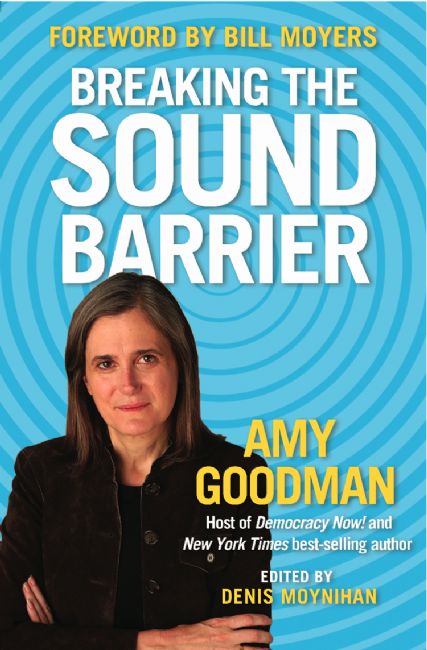
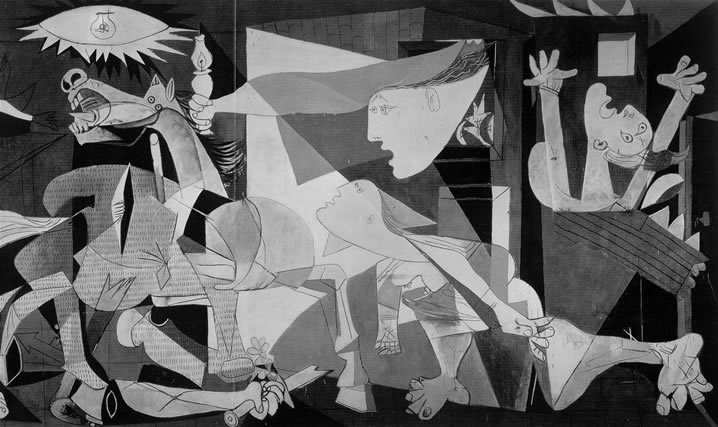
Amy Goodman: Breaking the Sound Barrier.
Today, we’re very pleased to talk with award-winning investigative journalist and syndicated columnist, author and the host/executive producer of Democracy Now! Amy Goodman. Her new book titled Breaking the Sound Barrier is a collection of wide-ranging articles reminding the reader of what true independent journalism can do. Amy’s style of journalism breaks through the corporate media noise with stories from community organizers in New Orleans to the brave soldiers resisting war in Iraq and Afghanistan. Truthout
Author and journalist Chris Hedges writes : “Amy Goodman is one of the most important voices in America. She defies the noise and clamor of celebrity gossip. She challenges the manipulation of information and dissemination of lies by the power elite. She refuses to pander to a culture where news is seen as another form of entertainment designed to bolster corporate profits. She holds steadfast to the core values of our trade. Her integrity and honesty remind us that a culture that cannot distinguish between illusion and reality dies.”
Amy Goodman:
- Picasso’s famous anti-war painting Guernica in front of the UN Security Council. When Colin Powell went to the UN and they had a press conference, this painting was the backdrop and so they shrouded it in a blue curtain. We have to rip that shroud every which way, we have to tear it, because that’s what journalism is all about.
- Most of the voices in these columns are the people we interview on Democracy Now. The media is ahistoric, it whites out history. How are young people supposed to figure out what to do when they have no sense of what came before? What are the models, what works, what doesn’t work?
- Look at the money shifting from those who least have it to those who most have it, whether we’re talking about the economic meltdown. Obama surrounding himself by the Goldman Sachs folks.
- The model of community organizing has to be adopted by people all over the country.
- It’s not going to happen because there’s one person in the white house.
- The people with money and power walking the halls of the west wing, whispering in the commander in chief’s ear, and he says, if I do that, they will storm the Bastille.
- If there’s no one out there that he’s pointing at, we’re all in very big trouble.
- Breaking the Sound Barrier is the name of the column I do every week and the column appears in more than a hundred newspapers around the country. I think it is very important for people who consider themselves activists in this country hold their leaders accountable.
- It’s the right for people to conduct their lives in this country without being spied on or infiltrated.
Guest – Amy Goodman, host and executive producer of Democracy Now!, a national, daily, independent, award-winning news program airing on over 800 TV and radio stations in North America. Time Magazine named Democracy Now! its “Pick of the Podcasts,” along with NBC’s Meet the Press.
Goodman is the first journalist to receive the Right Livelihood Award, widely known as the ‘Alternative Nobel Prize’ for “developing an innovative model of truly independent grassroots political journalism that brings to millions of people the alternative voices that are often excluded by the mainstream media.” She is also one of the the first recipients, along with Salon.com blogger Glenn Greenwald, of the Park Center for Independent Media’s Izzy Award, named for the great muckraking journalist I.F. Stone.
—————————————————————-
Afghanistan War, Civil Liberties, Criminalizing Dissent, FBI Intrusion, Habeas Corpus, Human Rights, Surveillance, Targeting Muslims, Torture, Truth to Power
Podcast: Play in new window | Download
Listen to Law and Disorder live Monday November 9 at 9:00AM EST WBAI 99.5 FM: At 9:30 AM Michael Ratner Interviews Democracy Now’s Amy Goodman on her new book Breaking the Sound Barrier – Based on her columns for King Features Syndicate, this wide-ranging new collection of articles breaks through the corporate media’s lies, sound-bites, and silence. In place of the usual suspects— the “experts” who, in Goodman’s words, “know so little about so much, explain the world to us, and get it so wrong”
Updates:
Michael Ratner Update: Congress Should Not Reject Goldstone Report
—–
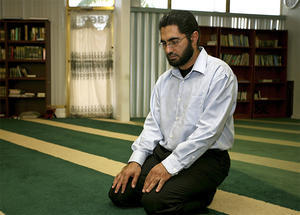
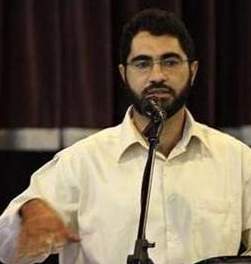
FBI Threaten Deportation To Muslim Man Refusing To Be Secret Informant
It was in 2004, that the FBI began to apply intense pressure on Foad Farahi to become a secret informant and spy on members of his mosque. Farahi, an Imam in Miami Florida refused. As many listeners may know, an imam is among the designated leaders in a community or mosque who leads prayers during gatherings and helps others understand the teachings of Islam. The FBI saw Farahi to be in a unique position to know local Muslim men. Farahi had met several South Floridians who allegedly had links to terrorism, including Jose Padilla.
Farahi refused to become a secret informant and the FBI knew he was in a vulnerable position. His student visa expired and he had applied for political asylum that could allow him to stay in the U.S. indefinitely. More than 2 years had past and in 2007, two agents showed up again asking Farahi to become an informant, he refused. In late 2007 Farahi was at a routine hearing for his political asylum case when he was told by his attorney that the ICE has a file with evidence that he is involved with a terrorist case. He was later presented with an ultimatum to drop the asylum case and leave the United States voluntarily, or be charged as a terrorist. Farahi agreed to voluntarily leave the US, but his passport expired, that gave him a little more time, and he later realized the government was bluffing and then hired attorney Ira Kurzban, a well-known advocate for immigrants’ rights.
(Law and Disorder archive Targeting Muslims Page 1 / Page 2)
Kurzban asked the Board of Immigration Appeals to throw out Farahi’s voluntary departure order, they refused. The legal battle has put Farahi’s immigration status in limbo. Kurzban told the Miami Times quote I think the real issue is, does the government have the right to pressure people… to make them informants?” —- “It’s clearly modus operandi of the FBI to recruit people who are going to be informants and to use whatever leverage they can.”
Ira Kurzban:
- Foad as an Imam, did not want to spy on others, but said to the FBI he would help them anyway he could.
- He was then put into removal (deportation) proceedings.
- The guilt by association method that the FBI has been using as an intimidation tactic is very reminiscent of the McCarthy period.
- The judge who originally denied Foad’s hearing was dismissed.
- We are now at the 11th Circuit of Appeals and an oral argument has been set.
- Immigrantslist.org – Political Action Committee
- This case represents a much broader pattern by the FBI and the government in trying to intimidate people into working as informants.
- They’re desperate to get informants but they’re using upstanding citizens to do bad things.
- The tragedy is that they’re turning people who are friendly to the United States into enemies.
Guest – Attorney Ira Kurzban, an adjunct faculty member in Immigration and Nationality Law at the University of Miami School of Law and Nova Southeastern University School of Law and has lectured and published extensively in the field of immigration law, including articles in the Harvard Law Review, San Diego Law Review and other publications.
——–
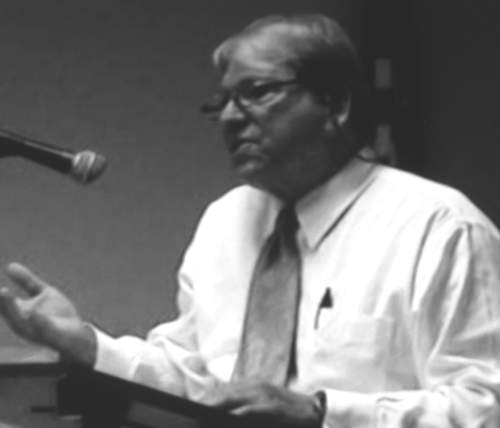
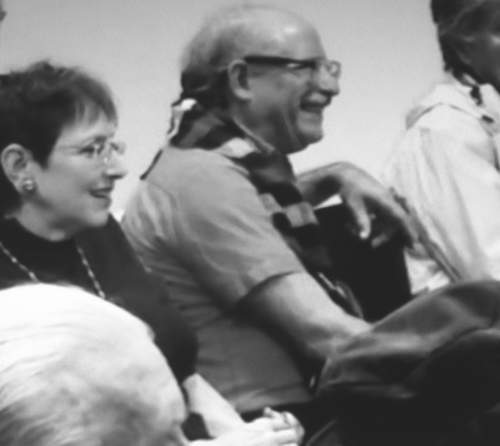
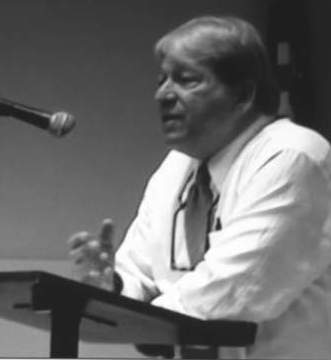
Michael Steven Smith – In Memory of Bob Boehm, Center for Constitutional Rights Vice President
On the recent eighth anniversary of the events of September 11th, our own Michael Steven Smith, draws a balance sheet on the state of democratic rights in America. He spoke to a captive audience on the long standing Five Towns Forum on Long Island in honor of recently deceased Center for Constitutional Rights Vice President Bob Boehm.
——-
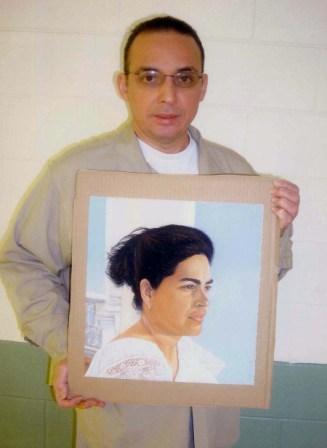
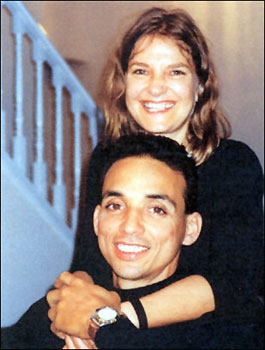
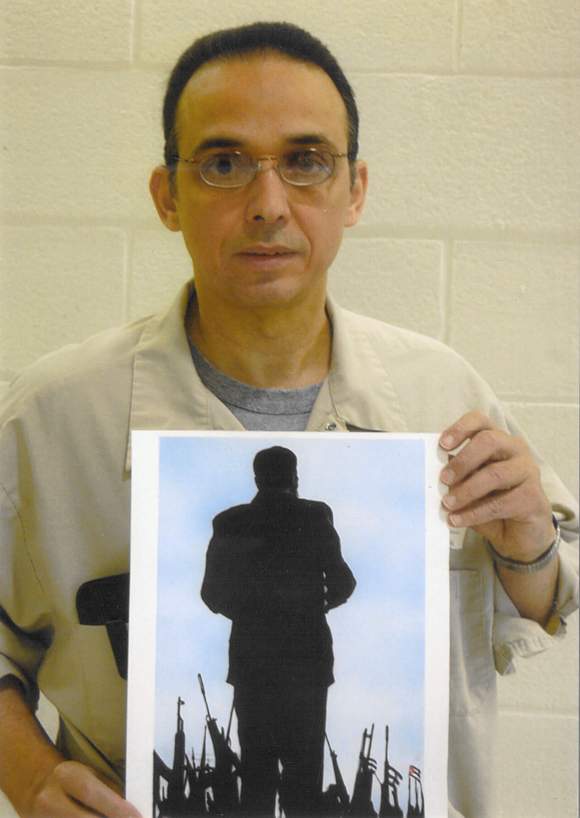
Cuban Five Update: The Re-sentencing of Antonio Guerrero
Earlier this month, Federal Judge Joan A Lenardo replaced the life sentence for Antonio Guerrero, one of the Cuban Five. Mr. Guerrero, a United States citizen, was convicted of spying for Cuba while working at the Naval Air Station in Key West. His sentence was reduced to almost 22 years, which means he could be out of prison in nearly seven years. Mr Guerrero’s attorneys had asked for the sentence to be reduced to 240 months, but Judge Lenardo set it at 262 months.
Mr. Guerrero’s lawyer, Len Weinglass told the New York Times, it was an odd decision, he said “You have a man who was on a military base but who didn’t take a single classified document and no one testified that he injured U.S. national security, but the judge still rejects the prosecutors’ request to lighten the sentence.” Transcript of Hearing
Len Weinglass:
- Antonio Guerrero who I represent, was originally sentenced to life in prison.
- The appellate courts reduced the life sentence for the conspiracy to commit espionage against 3 of the Cuban Five
- The decision only remanded life sentences for ultimately 2 of the Cuban Five including Antonio Guerrero
- We returned to Miami for the re-sentencing on October 13. Prior to the re-sentencing, we negotiated with the government on the issue of re-sentencing alone, making it clear there was no admission of guilt on the underlying charge, which we are still contesting on a later collateral attack.
- We agreed that it should come down from a life sentence to a period of 20 years.
- In Miami, the judge took the very unusual step of setting the agreement aside, and set the term to 21 years and 10 months.
- You can’t give a life sentence ( in this case) on what they intended to get, you can only give a life sentence on top secret information they did get. So, the original life sentence was wrong.
- When we got into the re-sentencing hearing, she got back to her original position as if the appellate court hadn’t ruled.
- I got very upset, the courtroom was packed. Packed with the same old crowd. The crowd in Miami that backs these para-miltary forces, they put the widows up front.
- I got upset at what I sought to be a climate that was being generated in that hearing and so I reminded the judge very forcibly that she was sentencing an individual not a country.
- I had given the court government documents from the Bureau of Prisons, all of them saying that Antonio Guerrero who was serving a faulty life sentence, and sent to a maxium security prison, which he shouldn’t have been sent, because the sentence was wrong.
- But the warden, his counselor and the supervisor of the unit, all extolled his behavior and most significantly pointed out that he had helped save a number of inmates all of whom were doing life sentences, from an encouragable future, by training them in English and Math and overseeing them getting their GED.
- At that time, she was about to pronounce sentence, then she stopped, walked off the bench.
- When the judge came back, the first thing she did is recite a Supreme Court decision, all federal judges must sentence an individual according to his character.
- Antonio was 39 when he was arrested and he will be nearly 60 when he is released. That’s the heart of a lifetime.
- There was no acknowledgment of context here. That this was provoked by a pattern of violence by the US directed at Cuba. Where more than 3000 people have died in the past 40 years from violence coming from Southern Florida.
- The Cuban Five performed their task, nobody was harmed, no property damaged and they end up with life sentences for that operation.
- It came to light that the federal government was paying members of the press in Miami as part of their anti-Castro campaign to write articles about this case that were highly prejudicial. People who were reporters but were on the federal payroll.
- Can the government be responsible for creating a prejudicial atmosphere?
- He was at the most hard-nosed prison and after seven years the warden of that prison wrote the Regional Bureau of Prisons, asking that Antonio be released from that prison. He doesn’t belong, there, he is a lovely sensitive man.
Guest – Attorney Len Weinglass, who represented the Cuban Five, as William Kunstler’s younger partner, Len Weinglass was considered the work horse of the defense team. He’s worked on a number of political cases including the Pentagon Papers trial and the Angela Davis case. He’s a Yale Law School graduate and former U.S. Air Force Captain.
—————————————————————————————————————-











